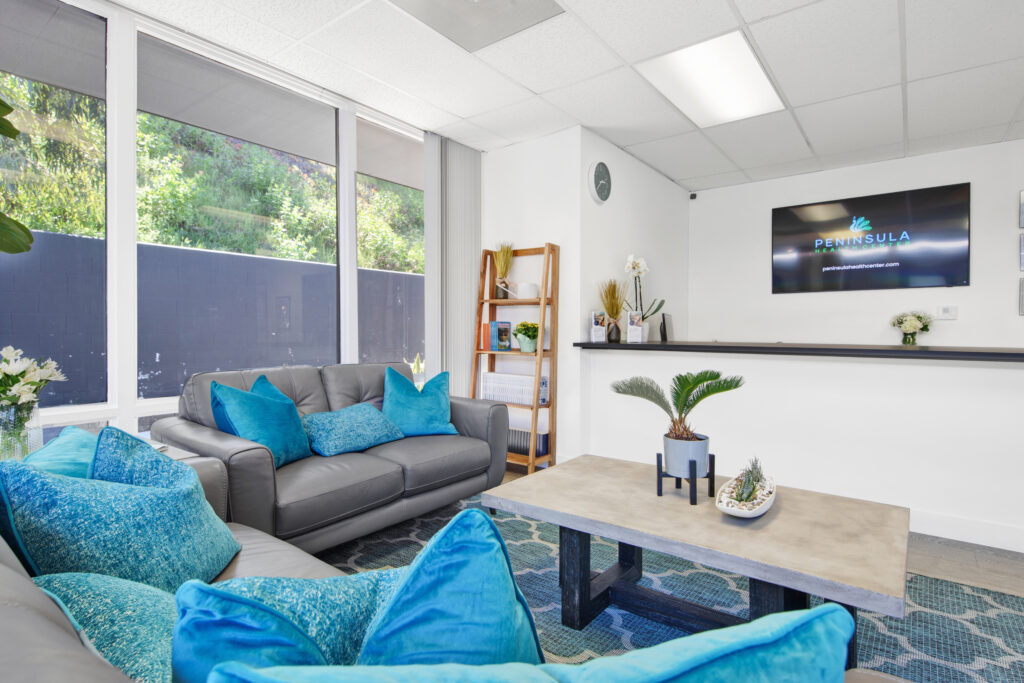Peninsula Health Center | Addiction Treatment in South Bay Area
Peninsula Health Center | Addiction Treatment in South Bay Area
Home / Programs & Therapies / Medication-Assisted
At Peninsula Health Center, we understand the complexities of addiction and the challenges it poses for those seeking recovery. Our Medication-Assisted Treatment (MAT) program, meticulously overseen by Dr. Matin Hemmat, a board-certified Addiction Medicine physician, is designed to provide comprehensive and compassionate care to individuals struggling with substance use disorders.
Expertly managed medication-assisted treatment options available to all clients.
We utilize the latest advancements to ensure all clients experience personalized care.
We offer day and night intensive outpatient options so you don't have to worry about missing out.
At Peninsula Health Center, we've established a world-class team of expert, caring treatment providers.
We offer integrative wellness solutions from addiction to mental health to overall health & wellness.
Our convenient location makes its easy to access top-notch addiction medicine in Southern California.
Medication-assisted treatment (MAT) integrates FDA-approved medications with substance abuse therapy, offering a comprehensive approach to address addiction on multiple fronts. This personalized approach tailors the medication used to meet each patient’s unique needs.
The initial days of quitting drugs or alcohol can be challenging, with withdrawal symptoms emerging shortly after the last use. These symptoms pose difficulties without proper assistance. MAT plays a crucial role by utilizing medications that diminish the intensity of cravings and other withdrawal effects, making the journey to recovery more manageable.
By alleviating withdrawal symptoms, such as cravings, headaches, anxiety, and depression, MAT allows individuals to focus on the vital aspect of their treatment—initiating the first strides towards healing and recovery.
Effective addiction treatment prioritizes the unique needs of the individual over a generic focus on the addiction or diagnosis. Our treatment team, employing a blend of proven therapeutic models alongside MAT services, is dedicated to guiding you toward leaving opioid addiction behind.

MAT combines medication, counseling, and behavioral therapies to treat substance use disorders. This integrated approach is vital for addressing the whole person, encompassing not just the physical aspects of addiction but also the psychological and emotional factors.
These medications are effective in reducing cravings and withdrawal symptoms associated with opioid addiction. They work by partially activating opioid receptors in the brain, helping to alleviate discomfort and stabilize the patient.
Used for both opioid and alcohol addiction, Naltrexone blocks the euphoric and sedative effects of opioids. It’s non-addictive and can reduce the likelihood of relapse.
Find out more about our dual-diagnosis programming at Peninsula Health Center in Palos Verdes.
Explore the different types of holistic treatment options offered at Peninsula Health Center.
Discover how our medication-assisted treatment program works and begin healing today.

Research studies have consistently demonstrated the noteworthy effectiveness of medication-assisted treatment (MAT) in addressing addiction. By mitigating the intensity of cravings and navigating the associated challenges, MAT empowers individuals to concentrate on their recovery journey.
In a double-blind placebo study, researchers found that medication-assisted treatment had a 90% confirmed drug abstinence rate, compared to just 35% of the placebo group. Treatment retention, drug craving, and relapse rates were also lower.
Each patient at Peninsula Health Center receives a personalized treatment plan. Dr. Hemmat, leveraging his extensive experience in addiction medicine, works closely with our team to ensure that the chosen medication is the best fit for the patient’s unique needs. Continuous monitoring and adjustments are made as necessary to optimize treatment efficacy.
Find out more about our dual-diagnosis programming at Peninsula Health Center in Palos Verdes.
Explore the different types of holistic treatment options offered at Peninsula Health Center.
Discover how our medication-assisted treatment program works and begin healing today.

In conjunction with MAT, we offer a range of supportive therapies, including individual counseling, group therapy, and family support programs. These therapies are essential in helping patients develop coping strategies, address underlying issues, and rebuild healthy relationships.
Get a free consultation right now. Fill out the form below to get a callback from our expert and caring admissions team. Whether you are a fit for our program or not, we will help you find the best treatment options that work for your personal needs.
Under the leadership of Dr. Hemmat, Peninsula Health Center is committed to providing a path to recovery that is grounded in the latest research and best practices in addiction medicine. Our goal is to not only treat addiction but to empower our patients to lead fulfilling, addiction-free lives.
For more information or to schedule a consultation, please contact us at 1-866-934-8228. Let us help you take the first step towards recovery and a brighter future.

Learn more about how Peninsula Health Center works with health insurance plans and how your insurance can help cover most of the costs associated with treatment.